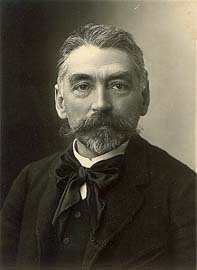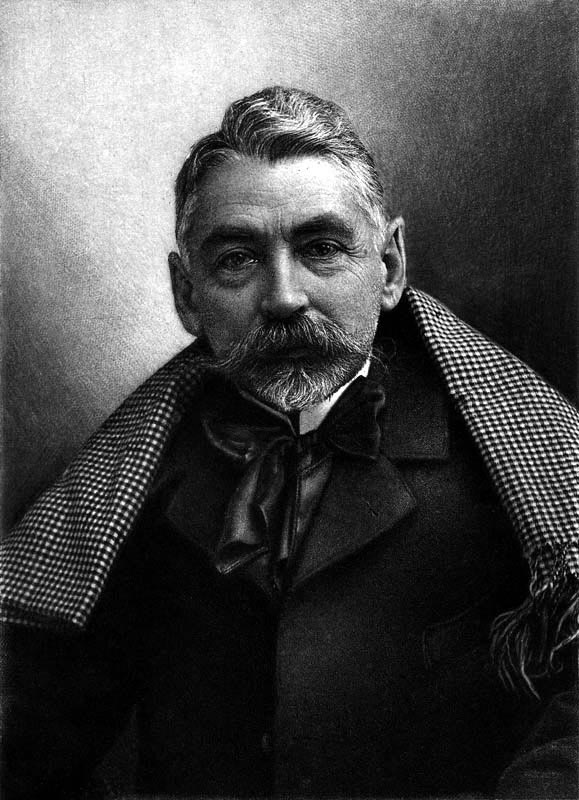Stéphane Mallarmé
(1842 - 1899)

Mallarmé turned the whole current of French poetry
(one might almost say, of all modernist poetry)
into a channel of which his poems were an opening.
SRI AUROBINDO
Le vierge, le vivace et le bel aujourd’hui
Va-t-il nous déchirer avec un coup d’aile ivre
Ce lac dur oublié que hante sous le givre
Le transparent glacier des vols qui n’ont pas fui!
Un cygne d’autrefois se souvient que c’est lui
Magnifique mais qui sans espoir se délivre
Pour n’avoir pas chanté la région où vivre
Quand du stérile hiver a resplendi l’ennui.
Tout son col secouera cette blanche agonie
Par l’espace infligée à l’oiseau qui le nie,
Mais non l’horreur du sol où le plumage est pris.
Fantôme qu’à ce lieu son pur éclat assigne,
Il s’immobilise au songe froid de mépris
Que vêt parmi l’exil inutile du Cygne.
Sri Aurobindo’s remarks:
«It is one of the finest sonnets I have ever read. Magnificent line, by the way, “Le transparent glacier des vols qui n’ont pas fui!”. This idea of the denied flights (imprisoned powers) of the soul that have frozen into a glacier seems to me as powerful as it is violent. Of course in French such expressions were quite new — in some other languages they were already possible. You will find lots of kindred things in the most modern poetry which specialises in violent revelatory (or at least would-be revelatory) images. You disapprove? Well one may do so, — classical taste does; but I find myself obliged here to admire.
[…] The swan is to my understanding not merely the poet who has not sung in the higher spaces of the consciousness, which is already a fine idea, but the soul that has not risen there and found its higher expression, the poet, if Mallarmé thought of that especially, being only a signal instance of this spiritual frustration. There can be no more powerful, moving and formidable expression of this spiritual frustration, this chilled and sterile greatness than the image of the frozen lake and the imprisoned swan as developed by Mallarmé.»
«The French language was too clear and limited to express mystic truths, so he had to wrestle with it and turn it this way and that to arrive at a mystic speech. Also he refused to be satisfied with anything that was a merely intellectual or even at all intellectual rendering of his vision. That is why the surface understanding finds it difficult to follow him. But he is so great that it has laboured to follow him all the same.»
«If these two magnificent sonnets [“Le vierge, le vivace et le beau aujourd’hui” and “Le tombeau d’Edgar Poe”] are not inspired then there is no such thing as inspiration. It is rubbish to say of a man who refused to limit himself by intellectual expression, that he was and intellectual artist. Symbolism, impressionism go beyond intellect to the pure sight and Mallarmé was the creator of symbolism.»
Le tombeau d’Edgar Poe
Tel qu’en Lui-même enfin l’éternité le change,
Le Poète suscite avec un glaive nu
Son siècle épouvanté de n’avoir pas connu
Que la mort triomphait dans cette voix étrange!
Eux, comme un vil sursaut d’hydre oyant jadis l’ange
Donner un sens plus pur aux mots de la tribu
Proclamèrent très haut le sortilège bu
Dans le flot sans honneur de quelque noir mélange.
Du sol et de la nue hostiles, ô grief!
Si notre idée avec ne sculpte un bas-relief
Dont la tombe de Poe éblouissante s’orne,
Calme bloc ici-bas chu d’un désastre obscur,
Que ce granit du moins montre à jamais sa borne
Aux noirs vols du Blasphème épars dans le futur.

